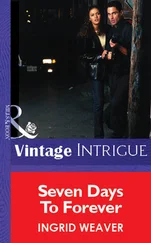“In,” Amelia said. “Can I help you?”
“Please, tell me it’s not four-thirty yet.”
Amelia shook her head. “My guess is it’s not past four.”
“Thank heavens,” she said. She dug into her knapsack and pulled out a frilly, pea-green apron. She nodded toward the doorway Amelia was blocking. “Excuse me, I need to get past.”
Evidently, Mae had hired a new waitress. Amelia’s stomach did another lurch, but this time it had nothing to do with the kitchen smells. She stepped aside, then followed the woman along the back hallway. “My name’s Amelia. I work here, too.” At least, she hoped she did.
“I’m Brittany.” She switched her pack from hand to hand as she shrugged into the apron, then fumbled to tie the apron strings behind her back.
“Hold still, I’ll get that,” Amelia said.
Brittany stopped so quickly her hair fell over her eyes. She flicked it back with a jerk of her head. A row of metal studs adorned the rim of her ear. “Thanks!”
“You can put your pack in the storeroom.” Amelia secured the apron with a neat bow. “It’s the door on the right.”
“Could you do it for me?” she asked, pushing the pack into Amelia’s hands. “I can’t be late on my first day.” She laughed nervously and headed for the dining room. “I seriously need this job,” she said over her shoulder.
Amelia ducked into the storeroom. The hook where her own apron usually hung was bare. She didn’t need a detective to tell her the apron had been given to Brittany. She dropped the pink pack on the shelf beside the ketchup cans and went in search of her boss.
Ronnie was jabbing toothpicks into a BLT when she reached the kitchen. He greeted her without meeting her eyes. At her question, he nodded his head toward the corner beside the freezer where they had set up their computer. Mae was peering at the screen while she held a cell phone to her ear. From the sound of things, she was blasting someone about a late delivery.
Amelia waited until she had finished her call before she spoke. “Hello, Mae.”
Mae swiveled on her chair to face her. She wouldn’t meet her gaze, either. “I meant to call you earlier, Amelia, but things have been busy.”
“Do I still have a job here?” she asked bluntly.
“That’s what I wanted to call you about.”
“I was wrong about winning the lottery. I told you that as soon as I found out.” In fact, she had been too dazed to think of phoning Mae until Sunday evening. It was only after she’d had no luck going door-to-door questioning her neighbors that she’d remembered her dramatic exit from the restaurant and had attempted to do damage control. “You said it was okay.”
“I reconsidered.”
“You said you understood yesterday. You told me I could come back.”
Mae gave her a tight smile. “I’m sorry, Amelia. We’ve already found someone else.”
“How? It’s only been a day. You wouldn’t have had time to advertise.”
“Ronnie called her. She’s his niece, and he knew she needed the job. She’s putting herself through college.”
“I need the job, too.”
Mae’s expression hardened. She rose from her chair. “You don’t need it as much as Brittany does. She’s trying to better herself. You’ve already got a degree. You had your shot at a career.”
“Sure, but—”
“You know as well as I do that you’re overqualified for this job. You weren’t happy being a waitress, Amelia. While I don’t have any complaints about your work here, I realized it wouldn’t last.”
“Quitting was a mistake.”
Mae shook her head. “The reason you quit might have been a mistake, but it was bound to happen sooner or later. We knew it was only a matter of time before you moved on to something better. I have to do what’s right for my business, and I need waitresses I can count on.”
Amelia took a deep breath, prepared to argue further, when she realized she had nothing to add.
Mae was right. This would have happened eventually, winning lottery ticket or not.
Unfortunately, her final financial safety net, flimsy though it might have been, was now gone. Worse, she was pinning her hopes for the future on a man she wasn’t sure she should trust.
For someone who had vowed she wouldn’t let history repeat itself, this was beginning to seem far too familiar.
CHAPTER FOUR
HANK HAD LEARNED that Tuesday evening was usually the best time to find people at home. It took into account anyone who might have gone away for a long weekend or might have needed an extra day to recover from a busy one. It was usually too early in the week for people to host dinner parties or pay social calls. There were variables like soccer games, or shift work, and with kids home from school for the summer, there were unforeseen, random events like emergency visits to the hospital to get a broken bone set or a split lip stitched, but on average, Tuesdays were good.
He left his car near the corner of the street where the Goodfellows lived and began with the house at the end of the block. Despite the pleasant breeze that had come up as the sun lowered, the front window was shut tight. The flowers in the bed beneath it had gone brown and the lawn was in bad need of a haircut. Even from the sidewalk he could see a raft of advertising flyers sticking out of the mailbox beside the front door.
Tuesday or not, the owners likely were away, and judging by the condition of the flowers and the lawn, they’d probably been away for more than a week. Still, Hank believed in being thorough. That’s why he was canvassing the neighbors even though Amelia said she already had. He knocked on the door, waited a full three minutes, then moved to the next house. This set of homeowners was in, but they told him they had been at their cottage all weekend, as their sunburns and mosquito bites attested.
He had no better results as he worked his way along one side of the street. It wasn’t until he reached a tidy bungalow in the middle of the other side that his luck changed. No one answered his knock at the front door, but the front window was open and lace curtains stirred in the breeze. A minivan with a Ducks Unlimited bumper sticker was parked in the driveway. Hank stepped around a bed of petunias and followed the smell of burning charcoal to the back of the house. A white picket fence enclosed the rear yard. He stopped at the gate.
A stocky, middle-aged man stood in front of a round-bottomed barbecue where a row of hamburger patties sizzled on the grill. He had a beer bottle in one hand and a spatula in the other. Close to the house there was a picnic table on a patio made up of square paving stones. A teenage boy with earphone wires trailing past his neck drummed the edge of the table with his index fingers. Seated across from him, a woman with startlingly blond hair waved flies away from a stack of plates and a bowl of what appeared to be potato salad. She was the first to spot Hank. She raised her eyebrows. “Hello?”
Hank put on his most affable smile. “Sorry to disturb you folks.”
The man turned toward him. His round face was bisected by a sharp-beaked nose. “Whatever it is, we don’t want any.”
“I’m not selling anything.” He pulled the folder with his ID from his jeans and flipped it open. “My name’s Hank Jones, and I’m hoping you could answer a few questions for me. It won’t take long.”
The boy stopped drumming and regarded Hank warily. He had a younger version of the man’s round face and prominent nose. “Are you a cop?”
“Policeman, Jacob,” the woman said softly. “Mind your manners.”
The boy shrugged. “Yeah, whatever.”
The man hooked the spatula on the barbecue. He started to lift his hand, as if to take a swig of his beer, but awkwardly halted the motion. “What’s this about, officer?”
Читать дальше












